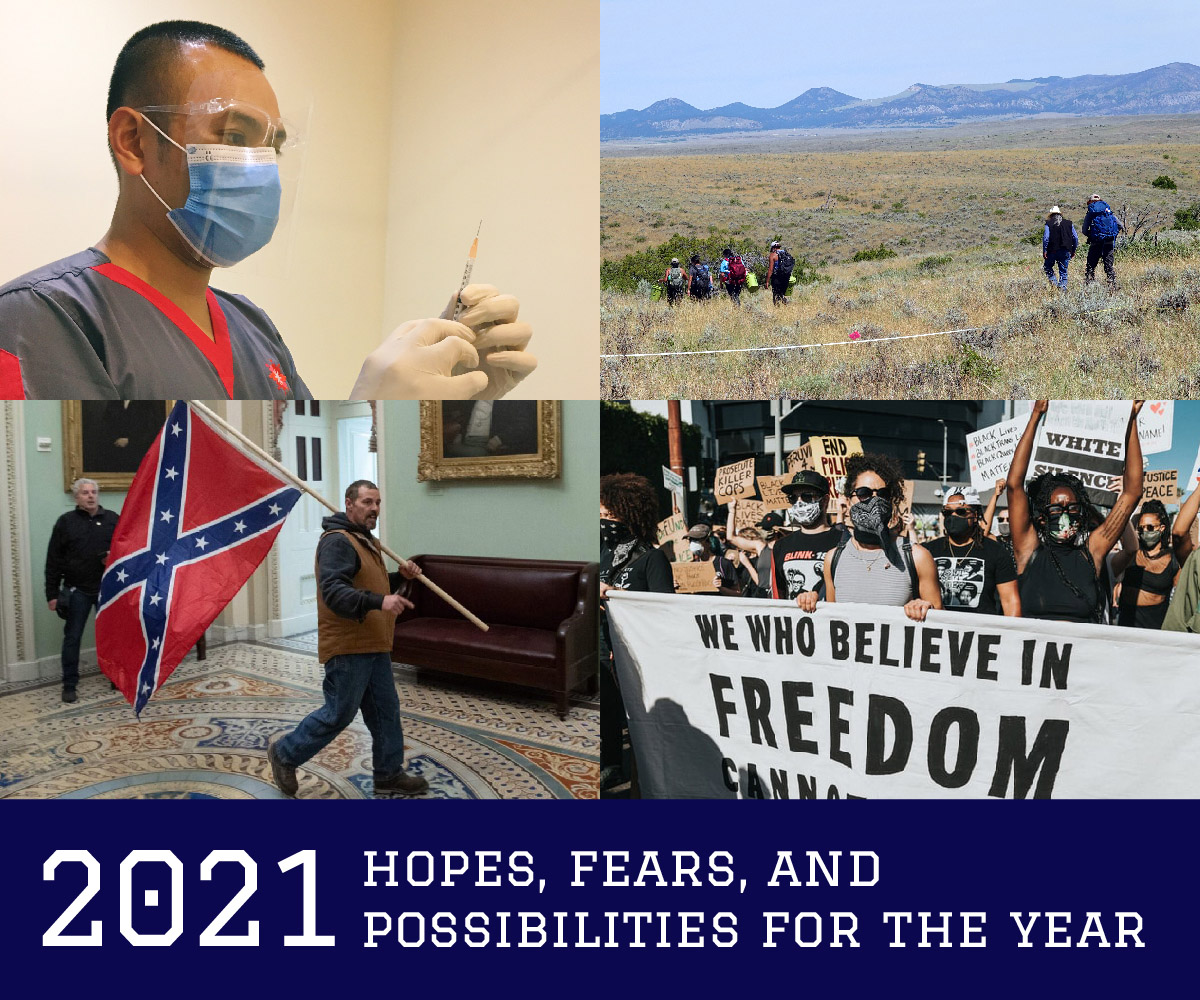
Photo credits, clockwise from upper left: Kristine Wook, Cristina Eisenberg, Nathen Domlo, wusa9.com
By Adela Najarro
When I first heard that White Supremacy was dead, I was in a car driving on a freeway in Northern California. I don’t remember the exact date nor year, but it was night, and I was listening to NPR. I remember how those words rang true even though I don’t remember the name of the show, nor who was speaking. It was an interview program, and they were discussing a recent publication, and how the author had determined that worldwide, Whiteness no-longer held power to persuade, that peoples everywhere had finally woken up to the hoax. It was a notion to celebrate, and one that has expanded into the turmoil and changes that we are living through. White supremacy, White dominance, White privilege is heading into its final generations, and people are scared, angry, and hopeful.
The fear and anger elected Trump, has allowed belief in Qnon, and has granted legitimacy and respect to White Supremacist terrorist groups. Those who stormed the capitol on January 6th, 2021, believed they were patriots saving the nation from dissolution. What’s dissolving is White Supremacy, and along with it, the privilege of a child going to an Ivy League school simply because they have attended the “right” schools, come from the “right” neighborhoods, and volunteered for the “right” organizations. As White privilege fades and begins to lose its power, many interpret this as a loss of the nation’s identity.
We remain wrapped in the myth of Whiteness through these times, and it will take many generations before this concept fades away like a fog that burns off in the heat of day. And it will necessitate a burning because at the root of Whiteness is injustice and greed. I teach at a community college, and each year, I retell the story of the European conquest of the very lands upon which we live, and that of almost the entire globe. I ask students to consider that Europeans left their homeland and conquered nearly every culture on the planet. And we talk about the details. But always in abstractions because the reality is too barbaric to imagine. We discuss women being “given” to soldiers. We mention the decimation of cultures. Brown and Black students pledge to stand up to oppression, and White students pledge to be allies. And we have to use these words, oppression, allies, decimation, because the feeling of whips, shackles, muskets, knives, ropes on flesh, starvation, rape, and the tearing asunder of the human body is too much for anyone to sit with for long.
And we have to say Europeans before we say Whiteness because we can all agree that we’re not Europeans. There’s a level of distance and safety—it’s not me. But then it is us—the “us” in U.S.A. We are grappling with the dismantling of White Supremacy in the U.S., and it’s getting ugly. But hasn’t it always been that way? The institution of slavery, the genocide of Native Americans, the usurpation of Mexican lands, and imperialistic overtures into Latin America, the Caribbean, the Philippines, and Guam are not blips in U.S. history nor unfortunate missteps of a burgeoning democratic nation. The U.S.’s economic and political power has arisen from legal, repeated, and institutionalized brutality intentionally inflicted upon brown and black bodies.
None of that came nicely. Nor with justice. Nor with compassion. When I’m at this point with students in my classes, someone will mention class rivalries or capitalism or even our lack of stewardship for the planet. But all of these can be located within Whiteness as the justification for the European conquest of the world. It’s all connected. Capitalism as we know it was built upon the decimation of peoples worldwide, which was justified by creating an idea: White Supremacy. It’s not just greed, but the idea that this greed is progress and that peoples throughout the world can be exploited because they’re inferior, lack refinement and culture, because they are not European, not White.
And we don’t believe that anymore! There is hope because we are living through the dissolution of White Supremacy, but it’s messy and violent. Hopefully, we can choose to work together and dismantle these systems to better the planet, our world, and the human community. We can work on halting global warming. We can legislate unbridled capitalism. We can dismantle White Supremacy.
Maybe there is sadness in knowing this history. Maybe it’s anger. Maybe it’s guilt. Perhaps, it’s time to celebrate. Again, going back to the students in my classes—we all agree that we can do better. It seems that the first step is to look back and acknowledge the barbarity through which we have ridden the wave to the present day. What is directly below our feet? On whose blood do we stand? Which bones broke so that our cars can drive on asphalt roads?

